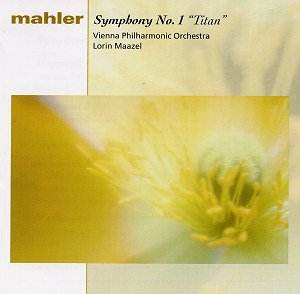Lorin Maazelís complete Mahler cycle for CBS came out
over a comparatively short period in the 1980s at the end of the LP
era and promised a lot. It was the first time that the great Vienna
Philharmonic had ever recorded a complete Mahler cycle. Lorin Maazelís
credentials as an experienced Mahlerian were well known if not universally
admired, and an experienced recording team led by producer David Motley
was on hand. It should have been special. In the end it proved something
of an expensive damp squib. Certainly the orchestral playing and sound
recording was all top notch, but Maazel himself proved somewhat below
par in many of the symphonies: heavily mannered and rather in love with
himself as reflected in the mirror of the music. The big exception was
the Fourth. There Maazel gave us one of the most satisfying recordings
of this elusive work ever made and I hope Sony have plans to reissue
that along with this First and also the Second and Ninth that I also
have in front of me for review.
The familiar spacious acoustic of the Musikverein in
Vienna is evident from the start with the atmospheric introduction to
the first movement evoking the distant summer vistas splendidly. However
once the familiar "Wayfarer" theme is under way Maazelís overriding
stress on the lyrical and the romantic underpowers this most youthful
of music with too much weight. Here is a wayfaring lad with too heavy
a bag on his back, I think. He should have more spring, more gaiety.
Maazel seems to take too long to unfold the movement and yet the clock
timing is no longer than average. The drag in the undertow seems all
in the delivery and the phrasing. Even the great outburst at the recapitulation
takes on a bloated grandiloquence that is inappropriate. This is followed
soon after by a coda that seems to try to make up for the leaden quality
of much of what preceded it by pressing forward in a mad dash for the
winning post. Itís a rush of blood that jars bizarrely. The second movement
is also too heavy-footed to allow the real snap of the ländler
rhythm to tell whilst the third movement is far too sophisticated, too
concerned with smoothing out the extraordinary sharp edges of Mahlerís
sound world and therefore the special character this music possesses.
Maazel seems to want to make it respectable whereas in its day it nearly
caused riots. Under the right interpreter with the right ideas we can
still catch something of the impudence of the young Mahler even now,
but not here. The last movement has its moments of grandeur and is certainly
as well played and recorded as the rest. But in the end it cannot save
a performance that I think misses its target largely because it doesnít
seem to have been pointing to it in the first place. Maazelís agenda
seems to be beauty and the warm glow of certainty above everything whereas
Mahler, especially at this point in his career, is concerned with much
more than that.
There are many great recordings of this work available
from all periods that serve it better than this. Kubelik (DG
449 735-2GOR), Walter (Sony
SM2K 64447 - a two disc set with Walter's classic recording of Mahler's
Second), Bernstein (DG
431 036-2), Horenstein (Unicorn UKCD2012), Chailly (Decca
448 813-2), Haitink (Philips
420 936-2). All in their different ways superior in interpretation
to Maazel and more than equal on playing and recording, though my own
preferences lie with Kubelik, Horenstein and Walter.
A disappointing interpretation from Maazel although
superbly played and richly recorded.
Tony Duggan
Visit Tony
Duggans Mahler Pages


